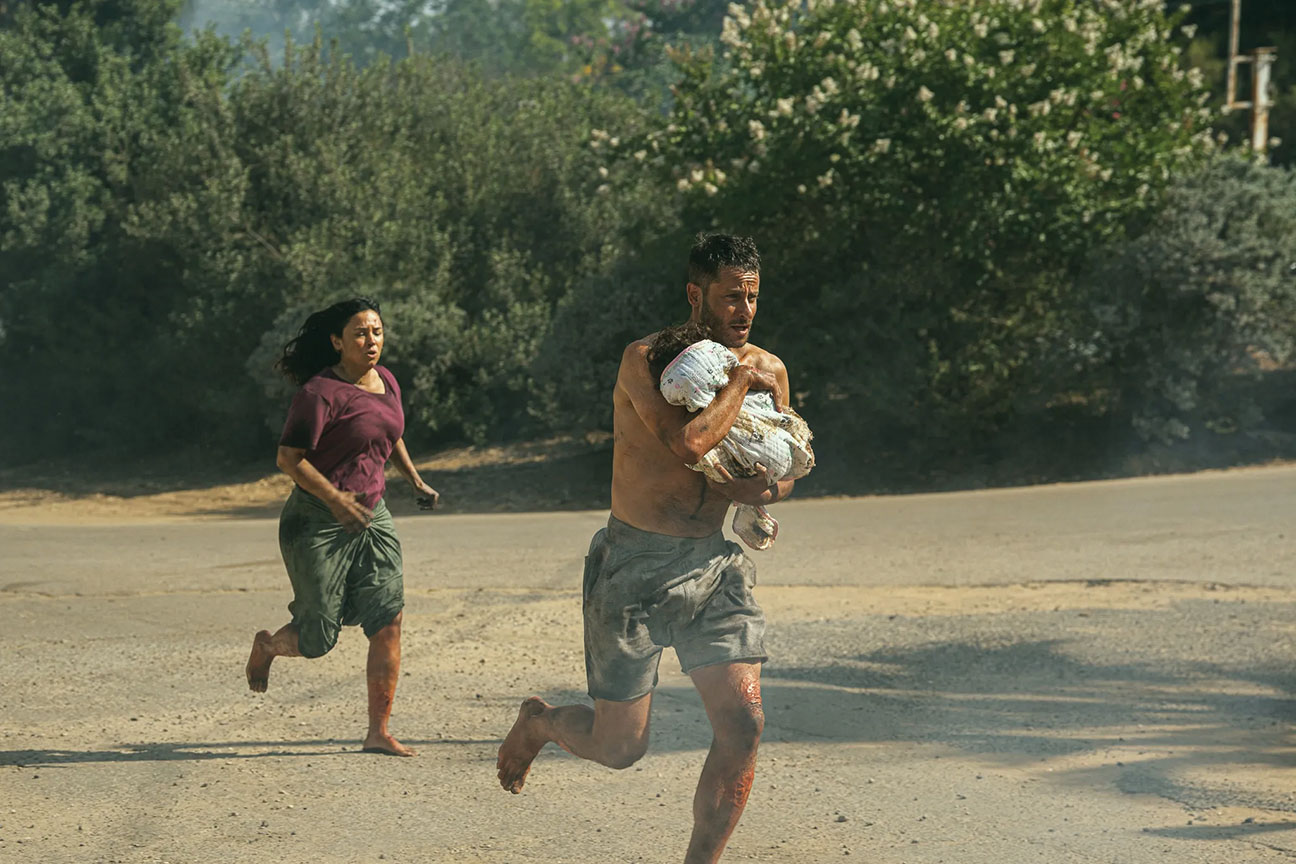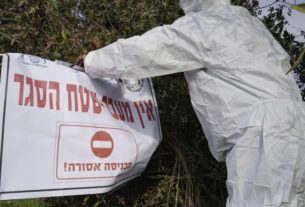On October 5, 2025, in Tel Aviv, I sat in a theater for the Israeli premiere of One Day in October, the upcoming HBO Max miniseries about October 7. It was two days before the second anniversary of that horrific day — a day that is not just history to me, but memory.
That Saturday, my family and I were jarred awake just before 6:30 a.m. by red-alert sirens piercing the dawn of what should have been a peaceful Shabbat & Simchat Torah, one of the holiest and most joyous days in the Jewish calendar.
We ran into the narrow stairwell of our apartment building — the only place without windows because we didn’t have a mamad (safe room). I remember hugging my one-year-old granddaughter and worrying about my elderly mother as we moved between that cramped stairwell and our apartment to check alerts, messages, and the latest horrifying rumors. We called relatives and friends — some at the Nova Music Festival, others heading south to the fighting — praying for good news.
The sound of sirens mixed with message pings. I remember the surreal sense that time itself had split in two — before and after.
So, when the lights dimmed for One Day in October, the silence that filled the theater felt familiar: the silence of people who have lived the story about to unfold.
At the premiere, producer Chaya Amor said something that captured what I had been feeling — and why, in full disclosure, I became an associate producer for the series: “We are telling a story as we are still living that story — because we are still living October 7th. The goal is to cut through all the noise and lies that followed October 7th with the truth — because the truth needs to be louder than the noise.”
The truth unfolded in the episodes shown that night.
Real Stories of Real People
The series interweaves the experiences of Israelis who lived October 7 in all its unimaginable horror. We saw the story of Omer Shem Tov, who spent 505 days in Hamas captivity — a reminder that while the series is titled One Day in October, that day has not ended. It continues for every hostage still held by Hamas and every Israeli praying for their return.
We saw the story of parents who saved their infant daughter as Gazan civilians marauded through their home, setting it ablaze with the family inside. And we met an incredible young woman and warrior who helped save her kibbutz from being overrun by terrorists.
These stories are not political narratives. They are human ones — filled with terror, courage, and impossible choices.
The Battle Over Storytelling
As I watched, I couldn’t help but think of another war — the one over how this day, and the war it ignited, will be remembered. We’ve already seen efforts to distort October 7 into something “complex” or “symmetrical,” as if Hamas’s deliberate, GoPro-documented barbarity were merely another side of a tragic misunderstanding.
That kind of moral fog isn’t new. The Nazis mastered the use of film and art to turn lies into culture, depicting Jews as vermin and conspirators — a visual language of dehumanization that paved the way to genocide.
Two decades later, the Soviets repurposed that same antisemitic vocabulary. In the 1960s and 70s, they rebranded the “antisemitism” as “anti-Zionism,” dressing the world’s oldest hatred in the language of anti-imperialism. Through state media, literature, and cinema, they portrayed Zionism — the Jewish movement for self-determination — as a sinister global conspiracy, even equating it with Nazism.
Their propaganda gave despots, terror groups, and pseudo-intellectuals permission to revive antisemitic tropes under the banner of virtue.
Now, nearly half a century later, we’re watching a new generation of “anti-Israel filmmakers” pick up where the Nazis and Soviets left off — producing “documentaries” and “political art” that excuse or relativize Hamas’s evil, shifting blame from the perpetrators of October 7 to their victims.
That is why projects like One Day in October matter so deeply. This isn’t propaganda; it’s the antidote — art that cuts through the moral noise with truth.
Humanity Amid Horror
The series doesn’t attempt to explain away evil. It focuses on the people who faced it — those who fought, hid, were taken captive, or helped others survive. It reminds us that heroism isn’t the absence of fear but the refusal to let fear erase humanity.
Two years later, Israel is still burying, rebuilding, and reckoning — still agonizing over its hostages. But One Day in October reminds us that our national story has always been about endurance: faith, hope, and survival in the face of tragedy and hate. We don’t choose our tragedies, but we choose how to tell them — and whether we let others twist them into something unrecognizable.
Bearing Witness
When the credits rolled after the first episode, the audience stayed silent for a long moment. Then came applause — steady, full of recognition. Some wept quietly; others sat motionless, as if trying to breathe again.
For me, it brought back the stairwell — the disbelief, the worry, the helplessness — but also gratitude. Gratitude for being alive, for my family, my people, and the storytellers who refuse to let our truth be buried beneath the world’s noise.
One Day in October is not easy to watch. It shouldn’t be. It is an act of witness — for those we lost, those who endured, and for a world too eager to forget what fascist terrorism looks like when it isn’t abstract.
On October 7, 2023, Israelis of every background — Jewish, Muslim, Druze, Bedouin — faced evil in its rawest form. On October 5, 2025, in a dark theater in Tel Aviv, we faced memory — and insisted that the truth, not the lies, must endure.
For the Jewish people, remembering has never been passive. It is how we mourn, how we fight, and how we survive.
Because in remembering, we refuse to let those who, in every generation, seek our destruction, have the last word.




